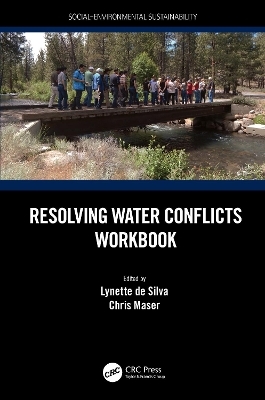
Resolving Water Conflicts Workbook
CRC Press (Verlag)
9780367469849 (ISBN)
This book works to build trust, consensus, and capacity to enhance understanding through a water conflict management framework designed to bolster collaborative skills. Built on case-studies analysis and hands-on real-life applications, it addresses issues of water insecurity of marginalized systems and communities, global water viability, institutional resilience, and the inclusion of faith-based traditions for climate action. The authors assess the complexities of climate challenges and explain how to create sustainable, effective, and efficient water approaches for an improved ecological and socioeconomic future within the UN's Sustainable Development Goals.
Lynette de Silva co-directors the Program in Water Conflict Management and Transformation, at Oregon State University. She teaches courses in water resources management; and, transforming water conflicts. She has acted as a consultant to United Nations Educational, Scientific and Cultural Organization (UNESCO), offering training to senior water professionals. Over the past 20 years, she has worked in areas emphasizing water resources and land management practices. In 2019, de Silva co-authored the book entitled, "Resolving Environmental Conflicts: Principles and Concepts," the third edition, through CRC Taylor and Francis Publishers. Chris Maser spent over 25 years as a research scientist in natural history and ecology in forest, shrub steppe, subarctic, desert, coastal, and agricultural settings. He has lived, worked, consulted, and/or lectured in: Austria • Canada • Chile • Egypt • France • Germany • Japan • Malaysia • Mexico • Nepal • Slovakia • Switzerland • and various settings in the United States. Today he is an independent author as well as an international lecturer, facilitator in resolving environmental conflicts, vision statements, and sustainable community development. He is also an international consultant in forest ecology and sustainable forestry practices.
Introduction by Lynette de Silva
Chapter 1: The Consequence of a Decision and the Case of the Aswan High Dam by Chris Maser
Chapter 2: Water Conflict Transformation by Lynette de Silva
Chapter 3: Evolving Water Governance under United States Law by Holly V. Campbell
Chapter 4: Different Systems, Common Conflicts by Holly V. Campbell and Liliana Pimentel
Chapter 5: Rights of Nature: The Relationship between Water and People by Cameron La Follette
Chapter 6: Intertribal Fishing Conflicts and Federal Obstruction in Oregon by David G. Lewis
Chapter 7: The Role of Gender in Water Conflicts by Jaclyn Best and Jahan Taganova
Chapter 8: Water Insecurities in Two African American Communities by Lynette de Silva
Chapter 9: A Global Water Solution: An Example of the Sustainable Development Goal Target 6.5 by Melissa McCracken
Chapter 10: Religious Worldviews, Environmental Values, and Conflict-Management Traditions by Josiah J. Shaver
Conclusion by Lynette de Silva
| Erscheinungsdatum | 15.12.2021 |
|---|---|
| Reihe/Serie | Social Environmental Sustainability |
| Zusatzinfo | 9 Tables, black and white; 4 Line drawings, black and white; 19 Halftones, black and white; 23 Illustrations, black and white |
| Verlagsort | London |
| Sprache | englisch |
| Maße | 156 x 234 mm |
| Gewicht | 521 g |
| Themenwelt | Naturwissenschaften ► Biologie ► Ökologie / Naturschutz |
| Naturwissenschaften ► Geowissenschaften ► Hydrologie / Ozeanografie | |
| Sozialwissenschaften ► Politik / Verwaltung ► Europäische / Internationale Politik | |
| Technik ► Umwelttechnik / Biotechnologie | |
| ISBN-13 | 9780367469849 / 9780367469849 |
| Zustand | Neuware |
| Informationen gemäß Produktsicherheitsverordnung (GPSR) | |
| Haben Sie eine Frage zum Produkt? |
aus dem Bereich


